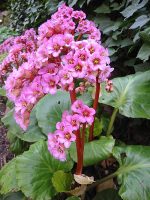 Purple bergenia is an evergreen herbaceous perennial and a member of the Saxafragaceae family that also includes astilbe, foam flower (Tiarella), and coral bells (Heuchera). It is native to eastern Asia including the Himalayas, western China, and northern Burma where they grow on rocky slopes, and in forests, scrub, and alpine meadows. Plants grow 12″ tall and form a rosette of leathery leaves from a rhizomatous root stock. The leaves are glossy, oval, and have hairy margins. They have a pinkish tinge when they emerge in the spring , develop dark green tops and reddish undersides in the summer, and become red to purple in fall and winter. Nodding clusters of deep pink flowers appear on reddish purple stems 16-18″ tall in spring. Purple bergenia is especially valued for its foliage as well as its flowers and is a good choice for rock gardens, woodland gardens, ground covers, edgers, and containers. The generic name, Bergenia, honors the 18th century German physician and botanist, Karl August von Bergen. The specific epithet, purpurascens, refers to the fall coloration of the leaves.
Purple bergenia is an evergreen herbaceous perennial and a member of the Saxafragaceae family that also includes astilbe, foam flower (Tiarella), and coral bells (Heuchera). It is native to eastern Asia including the Himalayas, western China, and northern Burma where they grow on rocky slopes, and in forests, scrub, and alpine meadows. Plants grow 12″ tall and form a rosette of leathery leaves from a rhizomatous root stock. The leaves are glossy, oval, and have hairy margins. They have a pinkish tinge when they emerge in the spring , develop dark green tops and reddish undersides in the summer, and become red to purple in fall and winter. Nodding clusters of deep pink flowers appear on reddish purple stems 16-18″ tall in spring. Purple bergenia is especially valued for its foliage as well as its flowers and is a good choice for rock gardens, woodland gardens, ground covers, edgers, and containers. The generic name, Bergenia, honors the 18th century German physician and botanist, Karl August von Bergen. The specific epithet, purpurascens, refers to the fall coloration of the leaves.
Type: Herbaceous perennial
Bloom: Nodding clusters of deep pink flowers on reddish purple stems 16-18″ tall in spring
Size: 12-18″ H x 12-24″ W
Light: Part to full shade
Soil: Fertile, consistently moist, well-drained
Hardiness: Zones 4-9
Care: Remove flower stalks after flowering
Pests and Diseases: Snails, slugs, vine weevil, aphids, thrips, leaf spot
Propagation: Division
Companion Plants: Fern, hosta, woodland phlox, Virginia bluebell